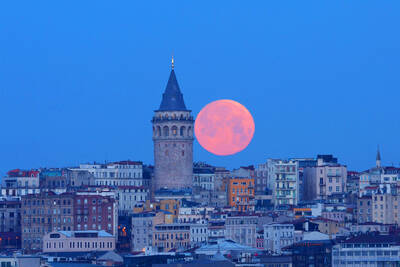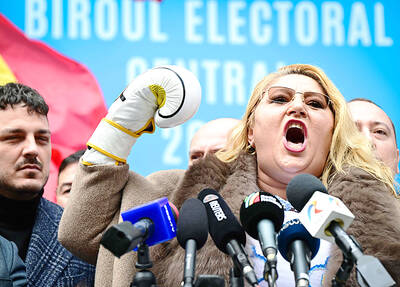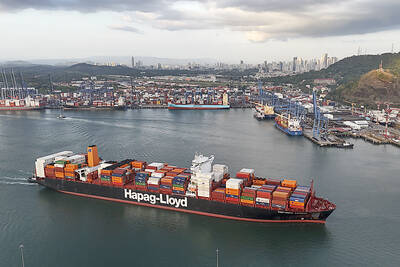Venezuelan President Hugo Chavez on Sunday touted a pact delivering fuel to Caribbean nations and loosened the financing terms to aid countries struggling with high oil prices.
Chavez said nations taking part in the Petrocaribe initiative will now be required to pay just 40 percent of the bill within 90 days — down from the current 50 percent. He said the rest can be paid over the next 25 years at a fixed interest rate of 1 percent as long as oil prices are above US$100 a barrel.
“That could compensate for the horrible curve of the jump in oil prices,” Chavez said.
He added that 70 percent of payments may be deferred if oil rises above US$200 a barrel.
ANTI-HUNGER SHIELD
Chavez said Venezuela aims to continue strengthening the Petrocaribe accord and make it into an “anti-hunger shield” for countries in the Caribbean and Central and South America.
Three years after Petrocaribe began, though, figures released by officials show the initiative is still not operating at full strength because of transportation and storage problems.
Oil Minister Rafael Ramirez said member countries other than Cuba are receiving a total of 86,000 barrels of oil a day — significantly less than their quota of 125,000.
Ramirez said Venezuela expects performance will improve with the expansion of an oil distribution network in the Caribbean, including installing storage tanks and rehabilitating Cuba’s Soviet-era Cienfuegos refinery.
St. Vincent and the Grenadines expects to complete construction of a storage facility next year with Venezuelan help, allowing it to boost the 300 barrels a day it currently receives — less than a third of its Petrocaribe quota, said Thornley Orsino Myers, who heads a St. Vincent electrical utility and accompanied his country’s delegation.
REGIONAL INDEPENDENCE
The pact has helped Chavez promote his vision of regional independence from the US. He used the summit to blame Washington for international economic problems, and called US military spending in Iraq “madness.”
He also denied criticism from Venezuelan opponents who said he is giving away Venezuela’s oil wealth.
Reading from an opposition statement accusing him of “bribery diplomacy,” Chavez mused. “It’s very probable this was written in the US Embassy.”
Some Petrocaribe member countries have the option of paying partially for oil with services or goods such as rice, bananas and sugar.
To help boost agriculture, Chavez said Venezuela will donate US$460 million from its oil proceeds annually to create an aid fund providing farming supplies and machinery in the region. He also offered to supply subsidized fertilizer to other countries.

DEBT BREAK: Friedrich Merz has vowed to do ‘whatever it takes’ to free up more money for defense and infrastructure at a time of growing geopolitical uncertainty Germany’s likely next leader Friedrich Merz was set yesterday to defend his unprecedented plans to massively ramp up defense and infrastructure spending in the Bundestag as lawmakers begin debating the proposals. Merz unveiled the plans last week, vowing his center-right Christian Democratic Union (CDU)/Christian Social Union (CSU) bloc and the center-left Social Democratic Party (SPD) — in talks to form a coalition after last month’s elections — would quickly push them through before the end of the current legislature. Fraying Europe-US ties under US President Donald Trump have fueled calls for Germany, long dependent on the US security umbrella, to quickly

RARE EVENT: While some cultures have a negative view of eclipses, others see them as a chance to show how people can work together, a scientist said Stargazers across a swathe of the world marveled at a dramatic red “Blood Moon” during a rare total lunar eclipse in the early hours of yesterday morning. The celestial spectacle was visible in the Americas and Pacific and Atlantic oceans, as well as in the westernmost parts of Europe and Africa. The phenomenon happens when the sun, Earth and moon line up, causing our planet to cast a giant shadow across its satellite. But as the Earth’s shadow crept across the moon, it did not entirely blot out its white glow — instead the moon glowed a reddish color. This is because the

Romania’s electoral commission on Saturday excluded a second far-right hopeful, Diana Sosoaca, from May’s presidential election, amid rising tension in the run-up to the May rerun of the poll. Earlier this month, Romania’s Central Electoral Bureau barred Calin Georgescu, an independent who was polling at about 40 percent ahead of the rerun election. Georgescu, a fierce EU and NATO critic, shot to prominence in November last year when he unexpectedly topped a first round of presidential voting. However, Romania’s constitutional court annulled the election after claims of Russian interference and a “massive” social media promotion in his favor. On Saturday, an electoral commission statement

Chinese authorities increased pressure on CK Hutchison Holdings Ltd over its plan to sell its Panama ports stake by sharing a second newspaper commentary attacking the deal. The Hong Kong and Macau Affairs Office on Saturday reposted a commentary originally published in Ta Kung Pao, saying the planned sale of the ports by the Hong Kong company had triggered deep concerns among Chinese people and questioned whether the deal was harming China and aiding evil. “Why were so many important ports transferred to ill-intentioned US forces so easily? What kind of political calculations are hidden in the so-called commercial behavior on the